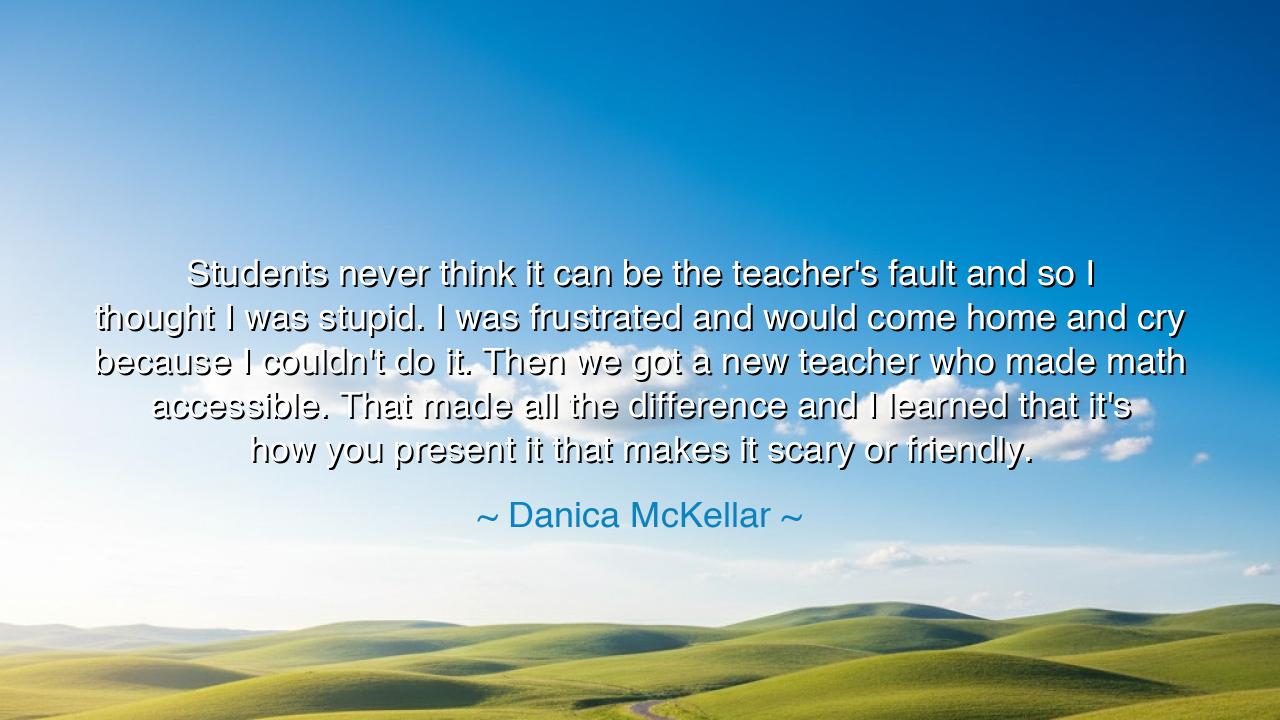
Students never think it can be the teacher's fault and so I
Students never think it can be the teacher's fault and so I thought I was stupid. I was frustrated and would come home and cry because I couldn't do it. Then we got a new teacher who made math accessible. That made all the difference and I learned that it's how you present it that makes it scary or friendly.






When Danica McKellar reflected, “Students never think it can be the teacher's fault and so I thought I was stupid. I was frustrated and would come home and cry because I couldn't do it. Then we got a new teacher who made math accessible. That made all the difference and I learned that it's how you present it that makes it scary or friendly,” she spoke not only of her own youth, but of a universal truth in education and in life. These words unveil the fragile hearts of students, who often believe that when they stumble, the failure must lie within themselves. Yet McKellar discovered that the presentation of knowledge—the way truth is offered—can transform despair into delight, terror into triumph.
The origin of this truth is found in the sacred bond between teacher and student. The child enters the classroom with an open heart, ready to believe in the authority of the one before them. If that authority cloaks knowledge in fear, in coldness, or in scorn, the child turns their judgment inward, assuming they are too dull to grasp it. But if the teacher wraps knowledge in clarity, warmth, and encouragement, the child discovers that learning is not a prison but a path. McKellar’s story shows us that the difference between scary and friendly is not in the subject itself, but in how it is given.
History offers many mirrors of this wisdom. Consider Socrates, who never stood before his pupils with lectures carved in stone, but questioned them, guided them, and helped them discover truth already within. His students, from Plato to Xenophon, remembered not a teacher who made them feel stupid, but one who taught them that wisdom could be drawn out through conversation and reflection. His greatness lay not in the complexity of his answers, but in the accessibility of his teaching. He made philosophy friendly, not terrifying.
Yet history also shows the darker side: how harsh teachers, rigid systems, and cruel methods can crush the love of learning. In medieval schools, students were often beaten for mistakes, their errors treated as moral failings rather than opportunities for growth. Many left not with wisdom but with wounds, convinced of their stupidity. McKellar’s tears echo across centuries of children who misjudged themselves because their guides failed to make the path clear. It is a tragedy repeated wherever presentation obscures truth instead of illuminating it.
The meaning of McKellar’s revelation is thus profound: intelligence is not a narrow gift given only to a few, but a spark in all, waiting to be nurtured by the right approach. The subject—whether mathematics or language or science—does not change; what changes is the bridge built by the teacher. Some bridges are steep, slippery, and terrifying; others are welcoming, firm, and radiant with encouragement. The role of the teacher is to build the bridge that invites the student to cross.
The lesson for us is clear: never confuse your struggles with proof of stupidity. Often, it is not your mind that is at fault, but the way the knowledge has been handed to you. Seek guides who illuminate, who make complex truths approachable. And if you are a teacher, a parent, or a leader, remember that the way you present knowledge is as important as the knowledge itself. A harsh word can close a mind for years; a kind explanation can open it for life.
Practically, let us live this truth by cultivating patience, clarity, and compassion when sharing what we know. If others struggle, let us not shame them, but reframe the lesson, offering another path until they see it. And when we struggle ourselves, let us not despair, but remember McKellar’s story: sometimes all it takes is a new perspective, a new voice, a new bridge, to turn the frightening into the friendly.
Thus her words endure as both confession and wisdom: the fault is often not in the student but in the teaching, and the greatest power of a teacher is to make knowledge approachable. Let us then honor both the learners who persist through struggle and the teachers who, with patience and creativity, turn tears into triumphs. For in this transformation lies the true dignity of education, and the hope of every generation.






AAdministratorAdministrator
Welcome, honored guests. Please leave a comment, we will respond soon